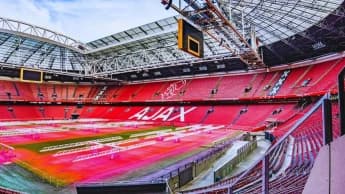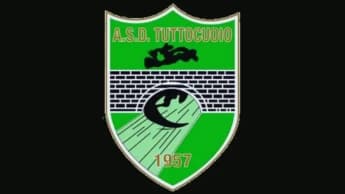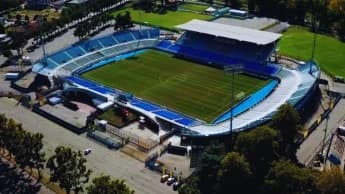
Mestalla Stadium stands as a cultural and architectural symbol of Valencia, hosting thrilling matches and enriching the community's deep-rooted footballing heritage since 1923.
Mestalla Stadium, known as Estadio de Mestalla in Spanish and Estadi de Mestalla in Valencian, is recognized as one of the most significant landmarks in Spanish football. Located in the vibrant city of Valencia, Spain, this historic site serves as the home for Valencia CF and also represents a cultural and architectural emblem. Since its opening on May 20, 1923, Mestalla has experienced almost a century of football achievements, moments of resilience, and a profound bond with its community.
Mestalla Stadium boasts a capacity of 49,430, making it the eighth-largest stadium in Spain and the largest in the Valencian Community. Positioned in the vibrant heart of Valencia, it captures the lively spirit of the city, bringing a unique energy to each matchday. The name of the stadium is derived from the historic irrigation canal of Mestalla, which dates back to the 10th and 11th centuries from the Arab dynasty. This canal, which was once located near the south stand of the stadium, serves as a significant reminder of the region's rich agricultural heritage and history.
A hallmark of Mestalla is its North Stand, famous for its steep incline that provides fans with an exhilarating and close-up view of the action. This architectural feature not only creates an intimidating atmosphere for opposing teams but also stands as a point of pride for the supporters of Valencia.
Throughout its history, Mestalla has evolved into more than just a football venue—it serves as a bastion of tradition, a center for fan culture, and a backdrop for some of the most memorable moments in football history. From hosting the Spanish national team to featuring unforgettable games in La Liga, the Copa del Rey, and the FIFA World Cup, Mestalla's importance extends beyond the city of Valencia, resonating with football enthusiasts worldwide.
Beyond its legacy in sports, Mestalla is culturally significant. During the Spanish Civil War, it served as both a concentration camp and a storage facility, underscoring its resilience and its ties to the broader narrative of Spanish history. Despite facing numerous challenges, including the severe flooding of 1957, the stadium has endured, continuously adapting and evolving over the decades.
Currently, Mestalla stands as a lively representation of Valencia's footballing culture, where enthusiasm intertwines with tradition, making each match a festive tribute to the beautiful game.
Memorable Matches
Throughout its existence, Mestalla has hosted numerous unforgettable matches, solidifying its reputation as an iconic site in the annals of football history:
These memorable events have left a lasting imprint of Mestalla in the hearts of football fans around the globe, highlighting its significance as a venue for extraordinary sporting moments.
Features & Facilities
Mestalla is not just a football stadium; it stands as a stronghold of fan culture and boasts modern, cutting-edge facilities:
Although it maintains a classic design, Mestalla harmoniously combines tradition with contemporary amenities, providing fans with a distinctive football experience.
Significance in History
Mestalla Stadium serves as a symbol of Spain's rich football culture and Valencia's crucial role in the development of the sport's history. Since its opening in 1923, this stadium has been the heart of Valencia CF, witnessing generations of football legends and hosting numerous unforgettable moments that have secured its place in the history of both Spanish and international football.
In its formative years, Mestalla rapidly emerged as a symbol of the increasing popularity of football in Spain. The stadium’s capacity expansions during the 1920s mirrored the swift ascent of the club and the growing enthusiasm of its fanbase. By hosting its inaugural international match in 1925, Mestalla started to cement its status as a leading venue for notable football events.
The historical importance of the stadium goes well beyond the realm of football. During the Spanish Civil War, Mestalla served an unconventional but vital function as a concentration camp and a storage site, reflecting the chaotic socio-political circumstances of that period. The war inflicted significant damage on the stadium, yet its subsequent rebuilding symbolized a message of resilience and regeneration, embodying the spirit of both the city and its inhabitants.
The 1950s were a pivotal decade for Mestalla, during which the stadium underwent significant renovations to expand its capacity to 60,000 spectators. This transformation established Mestalla as one of Spain's premier stadiums, enabling it to host key matches, including those during the 1982 FIFA World Cup. At that time, it was known as Estadio Luis Casanova, named in tribute to the esteemed president of Valencia CF. The stadium played a vital role in the World Cup, attracting fans from around the globe and reinforcing its reputation as an iconic international venue.
The significance of Mestalla in the history of Spanish football is closely linked to its connection with the Copa del Rey. This stadium has been the stage for ten finals, featuring iconic matches between Barcelona and Real Madrid, thus solidifying its reputation as a battleground for some of the fiercest rivalries in the sport. In addition to domestic tournaments, Mestalla has also served as a venue for the Spanish national team on various occasions, notably during the 1992 Barcelona Olympics, when Spain’s U-23 team won the gold medal.
The stadium has also provided refuge for other clubs in times of need. Levante UD used Mestalla as their temporary home, and Real Madrid hosted European Cup matches here while their own stadium underwent renovations. These instances highlight Mestalla’s significance not only for Valencia but for Spanish football overall.
In spite of contemporary developments, the stadium maintains an enduring allure. The ancient irrigation canal of Mestalla, which gives the stadium its name, continues to serve as a significant connection to the city’s cultural and historical heritage. The choice to change its name back from Estadio Luis Casanova to Mestalla in 1994 further solidified its status as a cherished landmark in Valencia.
Future Events
Mestalla Stadium remains a key venue for the hosting of prominent football matches and other important events. Serving as the home ground for Valencia CF, the stadium is central to the club's La Liga campaign, where supporters eagerly anticipate thrilling encounters against fierce rivals like Barcelona, Real Madrid, and local competitors Villarreal in the Valencian derby. In addition to league matches, Mestalla frequently acts as a platform for Copa del Rey games, a tournament in which the stadium boasts a rich history, having hosted several finals throughout its illustrious existence.
International football plays a significant role in the events hosted at Mestalla. The stadium has been the site of many historic matches for the Spanish national team and is also expected to host future friendly games, UEFA Nations League matches, and possibly fixtures related to Spain’s bid for the UEFA Euro 2032 tournament. Mestalla’s prime location, lively atmosphere, and iconic reputation make it an ideal venue for these events.
Moreover, during Valencia's renowned Fallas Festival, the city buzzes with tourists, and the stadium's prime location ensures that Mestalla is a vital part of the local festivities. The venue is also capable of hosting cultural or musical events, as its rich history and impressive architecture make it an appealing space for entertainment beyond just football.
As we look to the future, the upcoming completion of the Nou Mestalla introduces a fresh chapter in the stadium's history. The opening of Nou Mestalla will signify the start of a new era, while events at the current Mestalla will provide a sentimental farewell for fans who want to savor every final moment in this iconic location.
Experience for Fans
Experiencing an event at Mestalla Stadium goes beyond merely watching a football game; it is a deep dive into a vibrant and fervent atmosphere that embodies the passion Valencia holds for the sport. The exhilarating cheers of the crowd, particularly from the steep North Stand, generate a thrilling ambiance that can unsettle rivals and invigorate the home squad. The design of the stadium positions fans close to the play, making each goal, tackle, and celebration feel deeply personal.
For supporters, the experience of matchday starts well before the actual game begins. The Mestalla is conveniently situated in the lively city of Valencia, making it easy to reach, with great transportation options such as buses, metro services, and available parking nearby. The area around the stadium is filled with bustling cafes and bars where fans come together to savor pre-game meals, beverages, and conversations that elevate the excitement leading up to the match.
Within the stadium, spectators enjoy modern facilities that harmoniously integrate with the historic allure of Mestalla. With well-kept seating areas and a variety of food and drink vendors, the venue provides comfort while maintaining its unique character. Family-friendly zones and features for accessibility guarantee an inclusive atmosphere for all visitors.
The Valencia CF Museum, situated within the stadium, is an essential destination for supporters of the club as well as football history buffs. It features an impressive assortment of trophies, jerseys, and memorabilia that enables visitors to explore the club’s rich heritage. Additionally, guided tours of Mestalla offer an insider’s view of the iconic location, granting access to the dressing rooms, press areas, and the players’ tunnel, providing a distinctive insight into the workings of the stadium.





